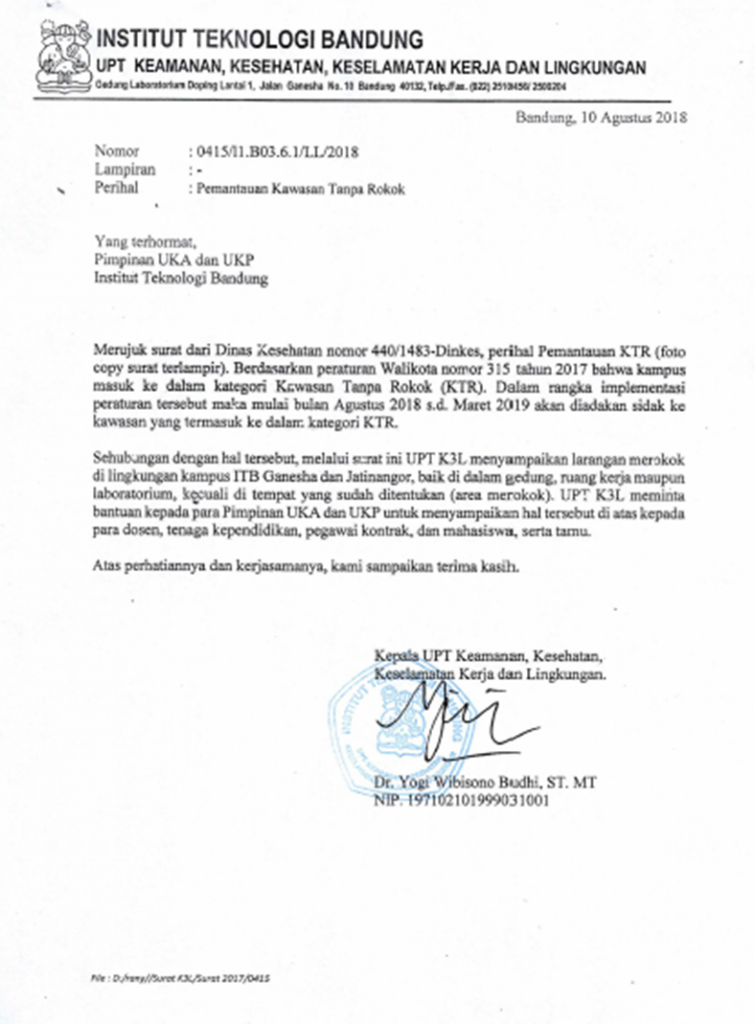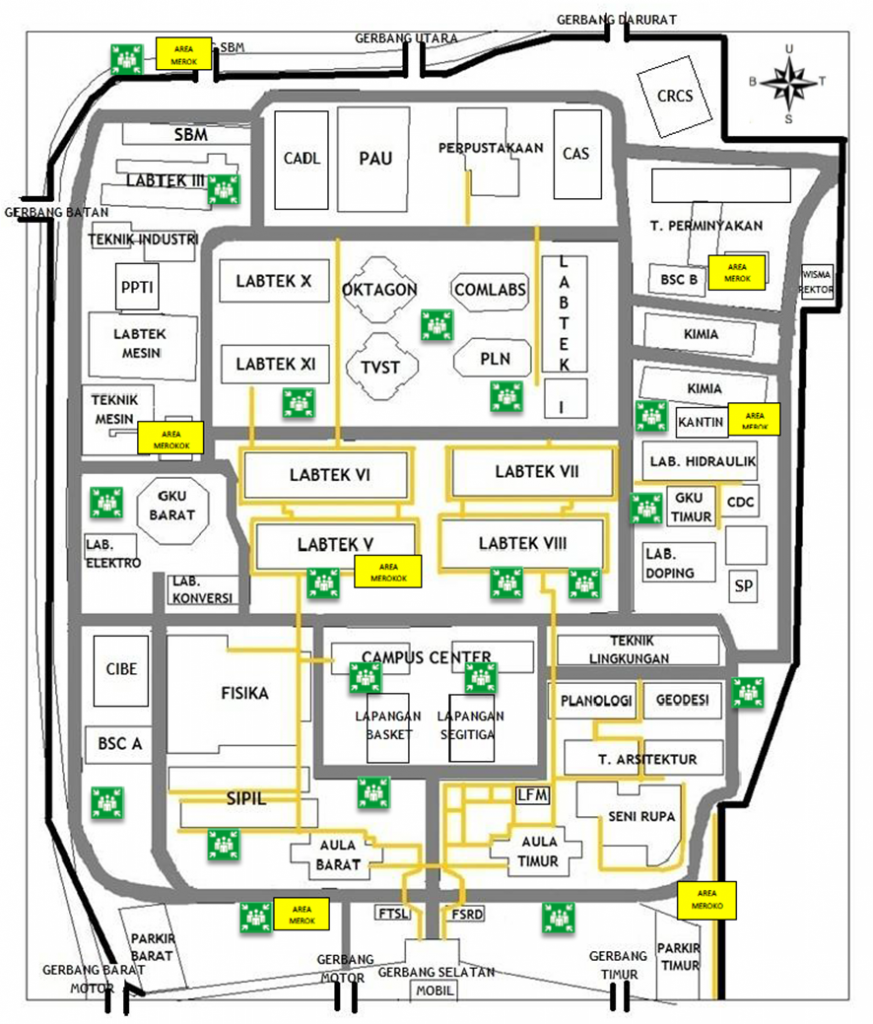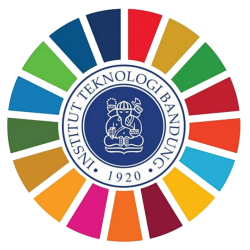SDG-3 Good Health and Well-being
Collaborations with local, national or global health institutions
There are several collaboration with local, national and international institutions. For local collaborations, ITB provides health service center and collaborate with local hospital for Crisis mental health service Center. Also, ITB Has Conducted Research and Developed an Early Detection Kit to eradicate stunting in Bandung (local).
For national collaboration, ITB collaborates with Labkes West Java which resulting collaborative study about One Year Into The Covid-19 Pandemic in Bandung
Crisis mental health service Center and health service center, the result of collaboration with local hospital

https://kemahasiswaan.itb.ac.id/bk/darurat
A Collaborative Study between SITH ITB and Labkes Jabar: One Year Into The Covid-19 Pandemic in Bandung
Adi Permana – Friday, 26 February 2021, 15:20:19 – Diperbaharui : Kamis, 1 – April – 2021, 09:21:03

BANDUNG, itb.ac.id – Covid-19 outbreak has been hitting Indonesia for almost a year. Tireless efforts have been made to combat the dangers during the Covid-19 pandemic. That is why School of Life Sciences and Technology (SITH) ITB had collaborated with the West Java’s Health Laboratory (Labkes Jabar) and the Bandung City Health Office (Dinkes) to held a webinar discussing the efforts and innovations done to fight Covid-19 which various efforts and innovations that have been made to eradicate COVID-19 which had been hit one-year mark in Bandung.
This webinar held on Wednesday (24/2/2021) presented two speakers, namely the Head of the West Java’s Health Laboratory drg. Ema Rahmawati, M.KM., the Head of the Bandung City Health Office dr. Ahyani Rakasnagara, M.Kes., Dr.rer.nat. Marselina I. Tan, and Azzania Fibriani, Ph.D. from ITB. The event began with remarks by the Dean of SITH ITB Dr. Endah Sulistiyawati and Vice-Rector of Research and Innovation Prof. Dr. I Gede Wenten.
In the first session, Ema talked over the Jabar Digital Service (JDS) application which is under the management of Covid-19 examining laboratory in West Java. She said that West Java’s Provincial Health Laboratory began using SIMLab Pikobar on June 15, 2020.
SIMLab Pikobar is an application run by Pikobar Health System super-application. This application displays various statistical data such as the number of positive and negative tests, also various other details such as the proportion of people testing positive, the average age of Covid-19 patients, and the changes of CT values’ monthly average based on results obtained from a sample. This application also will be developed and refined repeatedly for continuous improvement so that it can be integrated with equivalent applications run by Pikobar and Allrecord which belong to the Ministry of Health of the Republic of Indonesia.
Ahyani continued the presentation by addressing the results of the Covid-19 tests in Bandung City. 29.521 Covid-19 patients in West Java who were still under treatment. Also, West Java had 162.670 cured and 2.178 deaths. She also showed other various data such as the reproduction number of Covid-19 in Bandung, the number of hospital isolation rooms, the percentage of the isolation rooms’ availability, and the results of PCR and PDT testings.
Meanwhile, Marselina delivered the analysis of the results of the Whole Genome Sequencing (WGS) Coronavirus in Indonesia. The data displayed were the frequency of clades per province, monthly distribution of mutations and hotspots, also hotspot mutations in the S gene, N gene, NSP12, and any other new variant of SARS-CoV-2. Summing up, the mutated strains of Covid-19 which had been analyzed in Indonesia were the GH, GR, G, L, and O clade. Clade GH appeared to become the major circulating virus in Indonesia.
The last presentation was provided by Azzania who explained the analysis of the Covid-19 patients’ transcriptomic data. In this session, she elucidated various things about the Covid-19 effects on the human body. She described how DNA stores genetic information, how a gene is expressed in a transcriptome, and how Coronavirus infects the human body along with the levels and symptoms.
This study aimed at carrying out genomic and transcriptomic studies in patients who had moderate symptoms and patients who had no symptoms. On a final note, there were differences in the Covid- 19 WGS data, co-infection data, and transcriptomics data between patients with moderate symptoms and patients with asymptomatic and presymptomatic infection. Hopefully, this study’s results could be used for a better understanding of the pathogenicity of Covid-19.
Reporter: Yoel Enrico Meiliano (TPB FTI, 2020)
Translator: Zahra Annisa Fitri (Perencanaan Wilayah dan Kota, 2019).
Eradicating Stunting, ITB Has Conducted Research and Developed an Early Detection Kit
Adi Permana – Monday, 15 February 2021, 14:27:28 – Diperbaharui : Selasa, 7 – Desember – 2021, 11:27:33

BANDUNG, itb.ac.id—Pada Sabtu (6/2/2021), Ruang Riung Ceria mengadakan webinar sekaligus diskusi bersama pembicara-pembicara yang berasal dari berbagai latar belakang. Selama tiga jam, mereka membahas upaya-upaya yang dapat dilakukan untuk mengurangi jumlah kasus stunting, khususnya di Kota Bandung.
Stunting sendiri adalah kondisi gagal tumbuh pada anak balita akibat kekurangan gizi kronis. Menurut Rektor ITB, Prof. Reini Wirahadikusumah, Ph.D., dalam sambutannya, stunting merupakan sebuah isu sosial yang urgensi penyelesaiannya sangatlah besar. Ia mengatakan bahwa stunting adalah ancaman nyata bagi generasi muda dan masa depan Indonesia. “Oleh karena itu, sebagai isu yang locally relevant, ITB akan menyampaikan sumbangsih konkret yang bisa dilakukan oleh para civitas ITB,” pungkasnya.
Sementara itu menurut Dr. Indra Wibowo selaku Wakil Dekan Bidang Akademik SITH, stunting merupakan masalah penting sehingga penanganannya harus multidisiplin dan multinasional. Banyak kendala yang dapat menghambat upaya pemberantasannya, namun ITB sebagai sebuah instansi pendidikan berkomitmen untuk mengambil peran dalam menurunkan prevalansi stunting.

Ia menyebutkan selama beberapa tahun terakhir, ITB telah melakukan pemberdayaan masyarakat, pemetaan, riset, hingga pengembangan kit deteksi dini bersama kolaborator-kolaborator lainnya demi menekan jumlah kasus stunting di Jawa Barat yang telah mencapai angka 37%, lebih tinggi daripada kasus nasional—27%.
Pemaparan serupa juga disampaikan oleh Deputi Bidang Keluarga Berencana dan Kesehatan Reproduksi BKKBN dr. Eni Gustina, MPH. Ia menekankan pentingnya pendekatan pencegahan stunting yang retrospektif dan prospektif. BKKBN mendukung penuh usaha perencanaan pernikahan dan kehamilan sehingga dalam empat tahun ke depan, 20 juta bayi yang akan lahir di Indonesia tidak akan menderita stunting.
Selanjutnya, Dr. Rijanti Rahayu Maulani, dosen teknologi pascapanen SITH ITB, menyampaikan perspektif baru dari sisi ketahanan dan akses pangan guna mengatasi stunting. “Ada empat pilar ketahanan pangan yang dapat menjadi pegangan kita dalam berkolaborasi yaitu ketersediaan, keterjangkauan, stabilitas, dan utilisasi. Semua itu harus berdiri sehingga ketahanan pangan kita kokoh,” ujarnya.
Dr. Rijanti juga menjelaskan bahwa kunci dari pencegahan stunting adalah gizi yang baik dan tubuh yang sehat sehingga upaya kolaboratif harus dilakukan untuk memastikan ibu dan anak bisa mendapatkan akses pangan yang beragam dan terjangkau.
Untuk menutup sesi webinar, Ir. Didi Ruswandi, MT selaku Kepala Dinas Pekerjaan Umum Kota Bandung menjelaskan materi pengupayaan lingkungan lestari di periurban. Sebagai wilayah yang terhimpit kota dan desa, periurban memiliki karakteristik yang unik sehingga diperlukan pendekatan khusus. Bersama Dinas PU, ia berusaha membuat tatanan wilayah yang dapat memenuhi kebutuhan air bersih dan sanitasi masyarakat Kota Bandung.
Rangkaian acara ditutup dengan pembacaan kesimpulan webinar dan diskusi oleh Ramalis Sobandi, founder Yayasan Pilar Tunas Nusa. Dalam narasinya, Ramalis menyampaikan ajakan kepada semua pihak untuk memahami kondisi krisis stunting di periurban Kota Bandung dan melakukan usaha konkret untuk menurunkan angka stunting nasional di bawah 14% di 2024.
Reporter: Sekar Dianwidi B. (Rekayasa Hayati, 2019)
“Smoke-free” policy
Prohibition letter/notice of smoking in ITB Ganesha and Jatinangor campuses, both inside buildings, work spaces and laboratories, except in designated places (smoking areas).



Smoking designated area map in ITB
